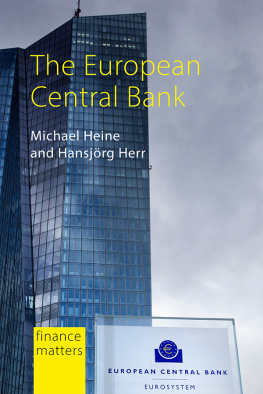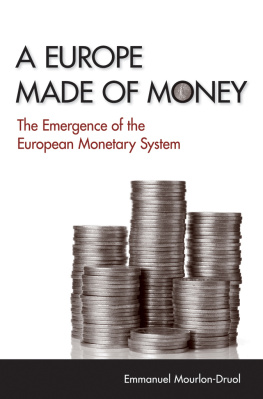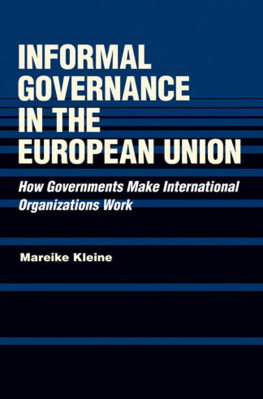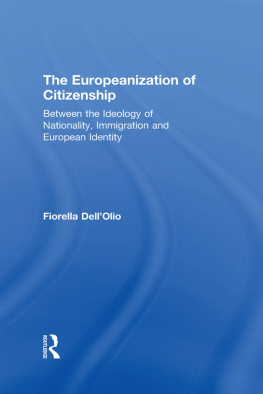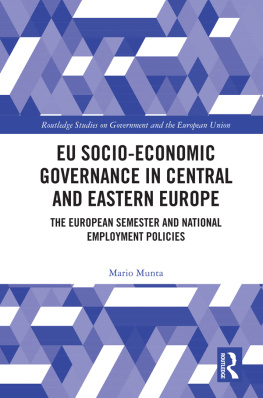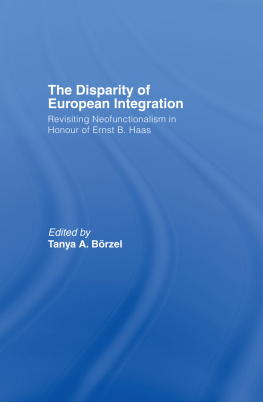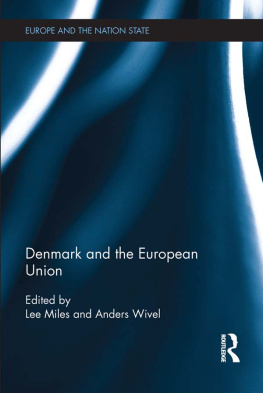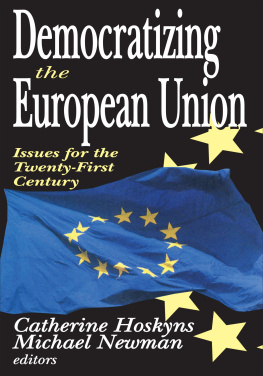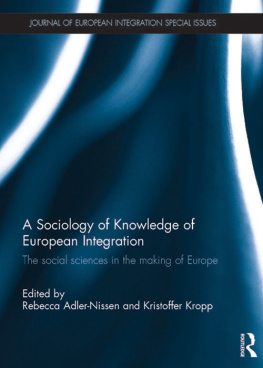First published 2000 by Ashgate Publishing
Reissued 2018 by Routledge
2 Park Square, Milton Park, Abingdon, Oxon, OX14 4RN
711 Third Avenue, New York, NY 10017, USA
Routledge is an imprint of the Taylor & Francis Group, an informa business
Copyright Leila Simona Talani 2000
All rights reserved. No part of this book may be reprinted or reproduced or utilised in any form or by any electronic, mechanical, or other means, now known or hereafter invented, including photocopying and recording, or in any information storage or retrieval system, without permission in writing from the publishers.
Notice:
Product or corporate names may be trademarks or registered trademarks, and are used only for identification and explanation without intent to infringe.
Publishers Note
The publisher has gone to great lengths to ensure the quality of this reprint but points out that some imperfections in the original copies may be apparent.
Disclaimer
The publisher has made every effort to trace copyright holders and welcomes correspondence from those they have been unable to contact.
A Library of Congress record exists under LC control number: 99075560
ISBN 13: 978-1-138-70084-0 (hbk)
ISBN 13: 978-1-315-20443-7 (ebk)
Setting the Problem
Only recently, and thanks to the seminal work of Susan Strange (1971, 1986 and 1998), have social scientists turned to devote more attention to the issue of international financial and monetary arrangements from an integrated political economy perspective.
However, notwithstanding the many and precious contributions to the development of this branch of international political economy (IPE) (see, for example, Underhill and Coleman, 1998; Underhill, 1997), it seems to the author that there is still some scope for speculation on the relation between sociopolitical and economic accounts of financial phenomena. There is, in a few words, the possibility of finding a convincing synthesis of the two cognitive and interpretative models and this is, ultimately, the aim of this book.
The broad theoretical context in which this contribution is to be inserted is given by the debate going on in IPE on the nature and sources of financial markets behaviour with a particular reference to foreign exchange markets. In the approach of both the economists and political scientists to the issue there is indeed a discussion going on as to whether financial markets behaviour should be considered as perfectly rational or absolutely illogical.1
This book will argue in favour of the rational behaviour of foreign exchange markets, but within a more structural definition of the credibility of exchange rate commitments which links together economic and political science perspectives. Indeed, when dealing with the problem of the reasons underlying a governments commitment to a pegged or fixed exchange rate regime, economic and political science analyses tend to differ consistently.
While political scientists focus primarily on a sociopolitical analysis aimed at tracing back the interests underlying exchange rate policy-making, economists tend to give importance to purely financial and economic variables as connected to the expectations of the markets.
In this book it is argued that both perspectives, if taken separately, can account only for a partial representation of reality and do not prove exhaustive of the many implications arising from the process of European monetary integration.
It becomes thus important to underline that the study of such an issue needs an integrated political economy approach in order to bring together in the discussion the two poles of the question.
The theoretical aim of this book is that of confronting the economists and political scientists approaches to exchange rate commitments and trying to reconcile them in an integrated political economy approach, where interests and expectations do appear as the two sides of the same coin.
In particular, this contribution seeks to explain why a country commits itself to fix its exchange rate, and why, at a certain point, the credibility of this commitment may fade triggering the rational expectations of the financial markets to re-orient towards a realignment of the exchange rate eventually, producing speculative attacks.
Thus, the following research question will be addressed: Why does a government decide to commit itself to fixed exchange rates? On what is the credibility of this commitment based? Why and when do the markets decide to bet on the lack of credibility of a similar commitment?
The analysis will be conducted on the cases of Italy and the United Kingdom and their experience in the exchange rate mechanism of the European monetary system. The period considered ranges from the decision of the two governments to peg their currencies in the ERM of the EMS to their departure on September 1992.
This is clearly an economic object of analysis with many economic consequences, but, according to the author, its political economy aspects should not be underestimated and may be fully understood by adopting a more sociological definition of credibility.
However, before doing so, it is worth having a look at the concurrent economic and political science contributions to the explanation of the issue of exchange rate commitments to see to what extent they leave room for an integrated political economy approach.
Interests: Political Scientists Approaches to Exchange Rate Commitments
The social science background in which to insert the issue of exchange rate commitment is represented by those IR/IPE approaches concerned with the sources of a governments commitment to international agreements, with particular reference to economic ones.
In this context the first relevant stream of theorising is represented by the literature on European integration and on EMU.
The theoretical debate over the issue of the European integration is characterised by the dichotomy between the neo-functionalist approach and the intergovernmental one (see Sandholtz, 1993).
The neo functionalist integration theory finds direct expression in the European Community since the community itself in its early stage was the inspiration for the thesis in the form in which it was originally offered by E.B. Haas in his study The Uniting of Europe (1958).
Neo-functionalist explanations of integration rest on the argument of spillovers, that is that integration in one issue area will reveal functional linkages to other issue areas. As a result, the desire to obtain the full benefits of integration in the first area would lead to pressures for integration in a second linked area.
In fact, neo-functionalists identify two sorts of spill-overs, each of which deepens and widens integration by working through interest group pressure, public opinion, elite socialisation or other domestic actors and processes. The first, functional spill-over, is economic and occurs when incomplete integration undermines the ability to achieve all the benefits of the existing policies, both in the areas that are already integrated and in related sectors of economy, thus automatically creating the need for further cooperation among the EC countries. The second, political spill-over, is linked to the fundamental role of existing EC institutions in giving impetus to a self-reinforcing process of institution building.


